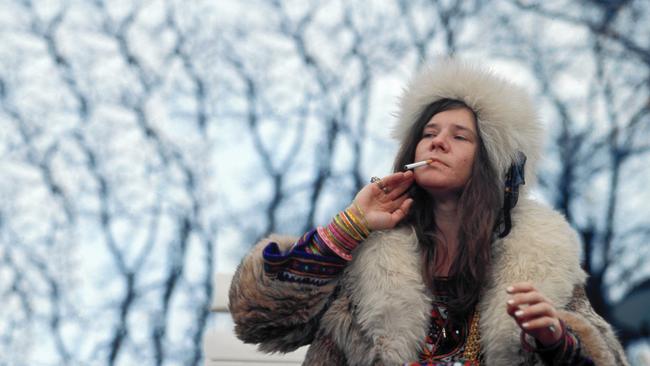 This year’s been a bruising one for musician loss, with David Bowie’s death followed by those of Merle Haggard and Prince. But it was almost more showing in 1970 when in a matter of days, both Jimi Hendrix and Janis Joplin were gone, and each of them was just 27.
This year’s been a bruising one for musician loss, with David Bowie’s death followed by those of Merle Haggard and Prince. But it was almost more showing in 1970 when in a matter of days, both Jimi Hendrix and Janis Joplin were gone, and each of them was just 27.
The shock of their deaths was compounded by their unrealized potential. The death of Joplin was particularly stinging because she had shown so much vulnerability in her performances in equal measure to her hair-raising vocal power.
“Janis: Little Girl Blue,” a sensitive portrait by Amy Berg premiering tonight on “American Masters” (PBS, 8 p.m., check local listings), shows how thoughtful the entertainer, sometimes dismissed as a party girl, really was. Both in oft-seen interviews with Dick Cavett and in personal letters to her family, she describes how quickly she became popular after some time of struggle, doing something she really loved — the blues songs she heard growing up.
Especially striking are the reading of her letters by Chan Marshall, better known as the singer Cat Power, with the same sort of soft Texas twang.
At a press session for the movie at the winter press session of the TV Critics Association, Big Brother & the Holding Company drummer Dave Getz was asked just how Joplin came to become the female singer they were seeking.
“We only auditioned a few singers before Janis,” Getz said. “Peter [Albin], who is the bass player and really started the band, was the main singer. I think he really was the only singer in a way. And he just thought he wasn’t good and he thought we should have a singer like the Jefferson Airplane or there was maybe one or two other bands that had women singers.
“And Janis, I think, was she’s only the third singer that I remember. But when she came, even before she came, I think a lot of us knew that she was going to be the one we were looking for. And, of course, when she opened her mouth and sang with us at the first rehearsal we had, to me it was just, you know, yeah, that’s it.”
Part of their success was that she shared some of the same musical knowledge.
“In the beginning, both Janis had a career in singing a lot of folk music and folk blues, and she liked people like Odetta ,” Getz said. “She knew a lot of the same repertoire that Peter did and also James [Gurley, the guitarist] to a certain extent. Sam [Andrew, guitarist and vocalist] was coming from more rock and roll place and I was coming from kind of a jazz place. But Peter and Janis knew a lot of songs together.
“One of the songs actually we did before she arrived, which is kind of crazy, but we did ‘Summertime.’ And then, of course, when she started singing it, it went into a whole other stratosphere. But it was mainly folk songs that both Peter and Janis knew from the basic San Francisco folk scene repertoire of the early ’60s.”
Getz said it was inevitable Joplin would break out on her own and start her own band given the attention she was getting.
“Yeah, I’d say probably sometime during probably the summer of 1968, after we’d finished making the album ‘Cheap Thrills,’” he said. “There was a sort of just a thing in the air that we knew. You could sense that it was coming, that once the album is getting close to being released, chances are she will [leave]. At least, I felt that. I can’t speak for the other guys, and two of them are gone now, so you know.”
Gurley died in 2009; guitarist Andrew died last year.
I wondered why, for all of her sheer talent and personality, Joplin is heard less on classic rock radio than other artists, furthering a theory that had been put out that it still might hurt too much for fans to hear it.
‘I don’t know,” her younger sister Laura Joplin said. “I hear her music a lot, and I don’t focus in her music on pain. I really feel it much more as joy.”
But filmmaker Amy Berg thinks “the legacy of Janis has been more it’s a little bit different than the legacy of like Jim Morrison or Jimi Hendrix because she’s a female.
“Like, if you see these lists that I looked at while I was doing research of the best singers of all time,” she said, “you never see Janis’ name. It’s always best female singer.
“She’s in a category that is probably more inhabited by men, because she came out there and did everything that men were doing but probably better,” Berg said. “I’m not saying that’s why people don’t play her on the radio. I haven’t noticed that myself. But I do think that after seeing the film, a lot of people have said they’ve gone home and downloaded everything about Janis, because we’re getting a lot of people in their 20s going to see the film that aren’t as familiar with her except through their parents.”
“And remember too,” Joplin said, “she only recorded three, four albums, so it’s hard to compete with the bands with a lot larger catalog.”
But Getz had his own theory. “I think that listening to her demands attention that doesn’t in some way work with contemporary radio as well as certain other things.”